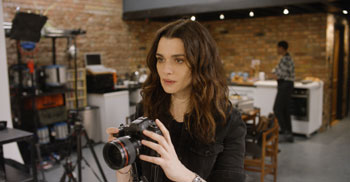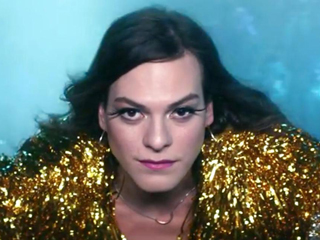Sebastián Lelio and Alessandro Nivola Disobedience Interview
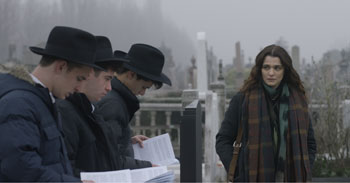
Set in an Orthodox Jewish Community
Cast: Rachel Weisz, Rachel McAdams, Alessandro Nivola
Director: Sebastián Lelio
Genre: Drama, Romance
Rated: MA15+
Running Time: 114 minutes
Synopsis: In a Jewish Orthodox Synagogue in Hendon, the frail Rav Krushka (Anton Lesser) collapses whilst giving a sermon. As funeral rites commence in London, the Rabbi's exiled daughter Ronit Khruska (Rachel Weisz) is living her life as a photographer in Manhattan. During a photo shoot she is told by the Brooklyn Synagogue of her father's death; wounded by the news and in a vulnerable state, she gets drunk in a local bar and sleeps with an undetermined man.
Ronit flies home to London where she feels out of place in the Orthodox Jewish community she left behind. She is greeted at the home of Dovid Kuperman (Alessandro Nivola), a son figure to the Rav, who is taken aback by the unexpected return of his childhood friend. Her welcome inside the home is hostile from those in the community gathering in the Rav's honour. Her aunt Fruma Hartog (Bernice Stegers) greets her more openly, though the air is frosty between Ronit and her uncle Moshe Hartog (Allan Corduner). Ronit is both upset and angry that she was not informed of her father's illness and that her father's obituary claims he was childless.
Despite tension surrounding Ronit's sudden departure in the past, Dovid invites her to stay with him and his wife. Ronit is shocked to discover that he is married to their former best friend Esti (Rachel McAdams), now a teacher at an Orthodox girls' school. It is uncomfortable between the two women; a complicated past is clearly hanging over them. The next day Ronit visits her father's grave. After further prayers at their home, Dovid, Esti and Ronit go to a dinner at the Hartog house with Rabbi Goldfarb (Nicholas Woodeson) and Rebbetzin Goldfarb (Liza Sadovy). Ronit tries to talk to her Uncle about selling her father's house, but he tells her now is not the right time for such a topic. Conversation turns to Ronit's successful career as a photographer and Rebbetzin questions why she goes by Ronnie Curtis after seeing one of her photos in a magazine. Esti, quietly joining in the conversation, states that women change their names all the time when they get married and lose their own history. Everyone is silently shocked at Esti's controversial comment.
Rebbetzin continues questioning Ronit's life in New York and asks why she is still not married, as it's the way it should be for a woman. Ronit disagrees, calling marriage an institutional obligation and if she had stayed in the community and been married off, she would have killed herself. Everyone is shocked by her outburst and Ronit, blaming her jet lag, excuses herself to go home. Dovid, upon Esti's request, leaves to walk her home. Ronit breaks down to Dovid, hoping her father knew she truly loved him. Dovid, struggling against the rules of his religion, tries to comfort his childhood friend without touching her.
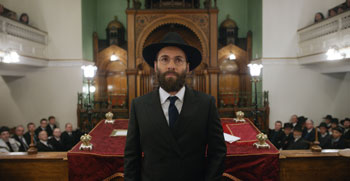 Ronit visits her uncle Hartog at his wigmaker's shop to continue the discussion of selling her father's house, but is informed by Hartog that the Rav left the house and all its contents to the Synagogue. She leaves and soon runs into Esti outside a supermarket. They visit the Rav's house together – a rundown mess full of medical equipment, it is not so much the house that Ronit wanted, but for her father to acknowledge her in his will. Esti admits that she does not want Ronit to leave again; past feelings are reignited and they kiss, at first timidly as Ronit pulls back, and then passionately. Ronit retreats once more, confused about her feelings.
Ronit visits her uncle Hartog at his wigmaker's shop to continue the discussion of selling her father's house, but is informed by Hartog that the Rav left the house and all its contents to the Synagogue. She leaves and soon runs into Esti outside a supermarket. They visit the Rav's house together – a rundown mess full of medical equipment, it is not so much the house that Ronit wanted, but for her father to acknowledge her in his will. Esti admits that she does not want Ronit to leave again; past feelings are reignited and they kiss, at first timidly as Ronit pulls back, and then passionately. Ronit retreats once more, confused about her feelings.
They leave the house and Esti confesses that she had called the Brooklyn Synagogue to let Ronit know of her father's death. She tells Ronit that she married Dovid, a man she doesn't love romantically but respects, as she was mentally unwell following Ronit's sudden departure and married their best friend upon the Rav's suggestion. As they relax into each other's company and kiss again, they are interrupted by Hinda (Clara Francis) and husband Lev (Mark Stobbart) and are unsure how much they saw. Esti rushes home, tense; she almost embraces Dovid but their marriage still lacks the passion she has with Ronit. At school, Esti is summoned to see the headmistress Mrs Shapiro (Caroline Gruber) where Hinda and Lev are waiting to confront her. Allegations about Esti and Ronit also plague Dovid when he is asked by the Synagogue to take on the Rav's work.
Ronit waits for Esti at the school gates, where Esti tells her about the formal complaint Hinda and Lev have submitted against her. Upon Ronit's suggestion, they escape the close knit community and head into central London for the day. Ronit and Esti continue to be conflicted in their attraction to one other; Esti feels guilty and is trying to lead a good life in line with her faith, but cannot help but desire her former lover. They go to a hotel where they make love, completely at ease and euphoric in each other's company. They talk about how Ronit's father first learnt of their relationship all those years ago.
Esti returns home late at night, where Dovid is waiting in their bedroom. He tries to get close to her but his yearning to be intimate with his wife is rebuked once again by a confused Esti. Nauseous the next day, Esti begins to wonder if she is pregnant. Dovid confronts Esti about Mrs Shapiro's accusations and she admits what happened between them. Dovid's anger almost turns violent as he releases his frustration at his wife's inability to embrace their life together. Ronit, having overheard the argument, tries to persuade Esti to leave her husband, but Esti struggles to come to a decision. They both try to convince each other, and themselves, they are happy in their lives.
Unable to cope with the current events, Dovid seeks refuge in a quiet Synagogue library. The atmosphere is tense when he returns home for dinner with Ronit and Esti. When Ronit announces that she has booked a flight back to New York that night, Dovid seems relieved and quietly asked his wife what she plans on doing now. Ronit and Esti share a difficult goodbye, both unable to share their true feelings. Esti accuses Ronit of taking the easy option by leaving, Ronit storms out the house and Esti slams the door behind her; both heartbroken at the recent events.
Returning home after failing in their search for Esti, Ronit is still angry that Dovid didn't tell her of her father's illness. Esti returns from hiding and, having heard everything, announces her pregnancy. Dovid is joyous, believing a child will solve all their marital problems, but Esti instead asks for freedom for her and her child. She was born into the community and wants to give her child the freedom of choice she never had. Dovid is speechless and Esti feels guilty for crushing her husband's dreams of becoming a father.
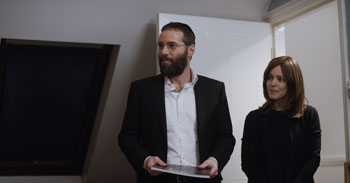 Ronit and Esti attend the Hesped at the Synagogue, intimidated by the judgemental looks they receive. Esti tries to make peace with Dovid, but he ignores her. Moved by the temple's sacred atmosphere, Ronit asks Esti to be with her in New York. They clutch hands as Dovid takes to the podium, where he struggles to deliver the official speech on the Rav's passing. Seeing Ronit in the crowd, he instead contemplates the notion of freedom and choice, a topic that the Rav spoke about in his final sermon, and grants Esti the autonomy she has requested. Dovid declines the Synagogue position and abruptly leaves the Hesped. Outside, overcome with emotion Esti and Dovid hug. Ronit watches on in the distance until Dovid extends an arm and the three friends have a long heartfelt hug together.
Ronit and Esti attend the Hesped at the Synagogue, intimidated by the judgemental looks they receive. Esti tries to make peace with Dovid, but he ignores her. Moved by the temple's sacred atmosphere, Ronit asks Esti to be with her in New York. They clutch hands as Dovid takes to the podium, where he struggles to deliver the official speech on the Rav's passing. Seeing Ronit in the crowd, he instead contemplates the notion of freedom and choice, a topic that the Rav spoke about in his final sermon, and grants Esti the autonomy she has requested. Dovid declines the Synagogue position and abruptly leaves the Hesped. Outside, overcome with emotion Esti and Dovid hug. Ronit watches on in the distance until Dovid extends an arm and the three friends have a long heartfelt hug together. The next morning, Ronit prepares to leave for the airport. She bids a quiet farewell to Dovid outside his bedroom and goes to see Esti, who has slept on the sofa. They say goodbye; it seems Esti has decided against joining Ronit in New York. As Ronit's taxi pulls away down the street, Esti runs after her and the pair share a long goodbye kiss, promising to remain in contact. An emotional Ronit visits her father's grave one last time and takes a photo, achieving a sense of closure over his passing and the recent events.
Disobedience
Release Date: June 14th, 2018
Interview with Sebastián Lelio
Question: What attracted you to the material and why did you want to explore this story?
Sebastián Lelio: I immediately fell in love with the three main characters; it is a love story between all three of them and how their relationships evolve and their lives are affected by these days of grief.
Question: As a Chilean director, how did you find working on the subject matter of Jewish Orthodox in North London?
Sebastián Lelio: The Jewish Orthodox background is of course very important but what's really going on in the film, in a certain way transcends that particular cultural specificity. The heart of the story is very universal.
Sebastián Lelio: I love actors and have a way of working with them where you're still able to see the person behind the character. So what you see on the screen is the person interpreting the character, you see an actor giving an artistic battle in front of your eyes and I do believe that is where the greatest amount of cinematic pleasure comes from.
Question: How would you describe the relationship between Ronit, Esti and Dovid?
Sebastián Lelio: Ronit is this modern, free spirited woman who has run away from her origins. Esti has stayed in the community but has run away from her true self. By letting Ronit know of her father's death, Esti not only allows Ronit the opportunity to reconnect with her origins, but also calls her own destiny; knowing this is her last chance to be set free. And there is this other important element of Dovid, the Rav's spiritual son and natural successor. The days of mourning allow all these passions and repressed feelings to come out and a new order is established.
Question: And what did Rachel Weisz, Rachel McAdams and Alessandro Nivola bring to the trio of friends?
Sebastián Lelio: They are like a rock'n'roll band with three guitar players, and that brought the main source of energy to the film; they're defending their characters and that creates great cinematic tension.
Question: What was it like to work with Rachel Weisz as a producer, as well as an actor?
Sebastián Lelio: One of the main reasons why I accepted the project was because Rachel Weisz was involved. I've always admired her and imagining her as Ronit with her rebellious soul was irresistible. We did write the script with her in mind to play Ronit, so all the things that I've always admired about her could have the opportunity to come out and shine, Ronit's personality created a lot of opportunities for complex emotions to emerge.
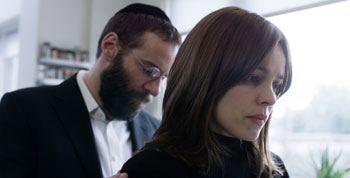 Question: How did Rachel McAdams come to be involved and what did she bring to the character of Esti?
Question: How did Rachel McAdams come to be involved and what did she bring to the character of Esti? Sebastián Lelio: Rachel McAdams had inner nobility and brought a lot of dignity to the character. During the years, Esti has become a master in disguise, hiding behind wigs and manners. But deep inside she's a desperate woman trying to reconnect with who she is. Even though Esti is navigating through a lot of complex situations, there is something very stable about her that allowed the character to be strong and fragile at the same time. Rachel McAdams was capable of dealing with all these complexities with incredible artistry and grace.
Question: Can you elaborate on the relationship between Ronit and Esti and what Rachel Weisz and McAdams brought to it?
Sebastián Lelio: I followed my intuition that the collision of Rachel Weisz and Rachel McAdams was going to be beautiful to see and generate great sparks. In a certain way, I saw Ronit and Esti as the same person divided in two. One escaped and became free, the other stayed and embraced the religion; but both paid a big price.
Question: What do you hope the audiences will feel whist watching Disobedience?
Sebastián Lelio: Disobedience is a very intense journey. The characters are going through a certain turmoil that defines the film and makes it oscillate between different tones. The story explores the whole emotional spectrum of Ronit, Esti and Dovid. They feel very real, very close. You feel like you are sitting at the dining tables and lying in those beds with the characters; Even though we might not know much about the very secretive world of London Jewish Orthodoxy, the film generates a very intimate, strangely familiar feeling.
Question: Why do you think it's an important story to tell at this time?
Sebastián Lelio: Disobedience is a story about confused human beings interacting and trying to do the best they can against a background of fixed conceptions. This is a story about characters that are willing to change and evolve, but to do so they have to go through very rigid structures and that confrontation resonates with what we're going through nowadays as a human society all over the world, where the old paradigms seem to be either obsolete or insufficient. I always felt that there was certain urgency in bringing Disobedience to life.
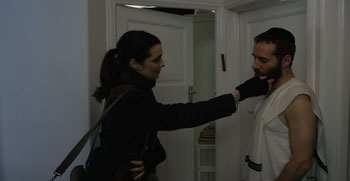 Interview with Alessandro Nivola
Interview with Alessandro Nivola
Question: What attracted you to the script when you first read it?
Alessandro Nivola: What attracted me to the script was the trio of friends that all mean well and yet somehow create a messy situation despite their affection for each other. It's a totally human situation that is unavoidable and painful.
Question: What was your initial reaction to reading the script?
Alessandro Nivola: I loved Sebastián's Gloria so I already knew how talented he was and became immediately curious to know more about his work. When I read the outline of the script, I thought Dovid would be a secondary character supporting the heart of the story, so I was surprised when he had more capacity and his story was integral to the overarching narrative. The script presented a problem that pits belief and religion against modernity and changing times and questions how to reconcile those two things. Dovid represented someone who had committed his life to his religion in a very intense and profound way, and has to reconcile those beliefs against his sense of goodness and his love for the people he is closest too. It really explored that dilemma for him in a detailed, complex and beautiful way.
Question: Did you use Naomi Alderman's book to further enhance your understanding of the character?
Alessandro Nivola: The descriptions of Dovid in the book and script varied quite a lot so my first instinct was to concentrate solely on the script as something that existed all on its own. But as I started to research the character, I felt this pull back to the book to get more details about the particular community. When I went back and started reading the book more closely, I realised that Dovid wasn't too different from how he had been rendered in the book and it became a really valuable resource for me.
Question: How much research did you undertake for the role?
Alessandro Nivola: The first thing I discovered when I started the research was that within the Orthodox community, there are a million shades of grey in terms of how people observe their religion. So the first challenge was to work out where this particular community was on that spectrum. The research I undertook was the most interesting that I've ever had as an actor, both intellectually and on a personal level. I met so many people that took me into their community. The friends that I've made at Shabaz dinners are friends for life. I have felt a responsibility throughout the making of the film to get across the incredible warmth of the Orthodox community. These are people who are full of passion and affection for each other. Sometimes the Orthodox is perceived like a hostile community; ruthless in its judgement of the outside world, but that hasn't been my experience.
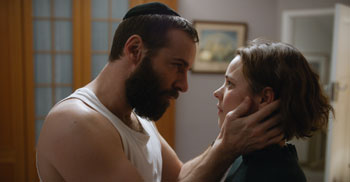 Question: Can you elaborate on Dovid's close relationship to Ronit's father?
Question: Can you elaborate on Dovid's close relationship to Ronit's father?
Alessandro Nivola: At a young age, he saw a quality and a connection with god in Dovid which could help bind the community together in a way that he had, so he became his pupil. Dovid's adolescence would have been spent with this man, which is how he came to be so close to Ronit and her best friend Esti, who he might not have known otherwise because young men and women are kept quite separate in the Orthodox world. After Ronit left, he became adopted by him as his only child so the situation is difficult for everyone. The man was essentially his father. His death at the beginning of the script really sparks of this confusing situation where she comes back to mourn him and I'm there mourning him like a father.
Question: Can you describe the relationship between Dovid and Esti?
Alessandro Nivola: I love the way that Dovid and Esti's relationship is written because it's a good marriage and they have a deep respect for one another. What is wrong with their marriage is so subtle and yet essential; she is a lesbian. There is every reason why Dovid and Esti could have gone all those years thinking their marriage was worth preserving, yet in the end she has to be who she is and love the way she is naturally inclined to love.
Question: What did Rachel McAdams bring to the role of Esti?
Alessandro Nivola: The character that I've watched her create has been a person who is incredibly shy, quiet seemingly meek, but with this burning furnace inside her. Esti is someone who is full of passion, but not accustomed to expressing herself that way and Rachel instantly understood that fundamental part of her character.
Question: What was it like to work with Rachel Weisz?
Alessandro Nivola: Rachel and I have a long history together; my first film in the UK was co-starring with her in 1998. It was wonderful to work together again after all those years. Rachel has a rebellious soul, so I could see why she responded to the book and designed this role for herself. She's fearless and has a little bit of mischief in her eye.
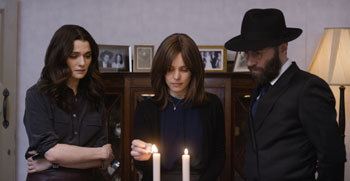 Question: What did you enjoy most about working with Sebastián?
Question: What did you enjoy most about working with Sebastián?
Alessandro Nivola: I've felt completely free even within the boundaries of what my character's behaviour would be. From the first moment we met and talked about the way that he wanted to work, it became clear that performance was really the most important element.
Question: What do you hope audiences will take away from watching the film?
Alessandro Nivola: Life is always presenting you with situations that aren't easily resolved. So ideally people will walk away without easy answers; the best stories are the ones that aren't packed. Hopefully people will walk away having had their opinions and preconceptions about certain life challenged.
Disobedience
Release Date: June 14th, 2018
Have You Seen This?
MORE
- Mission: Impossible Fallout
- Glenn Close The Wife
- Allison Chhorn Stanley's Mouth Interview
- Benicio Del Toro Sicario: Day of the Soldado
- Dame Judi Dench Tea With The Dames
- Sandra Bullock Ocean's 8
- Chris Pratt Jurassic World: Fallen Kingdom
- Claudia Sangiorgi Dalimore and Michelle Grace...
- Rachel McAdams Disobedience Interview
- Sebastián Lelio and Alessandro Nivola...
- Perri Cummings Trench Interview

